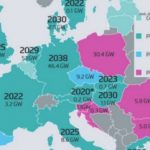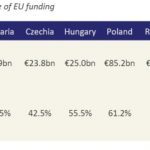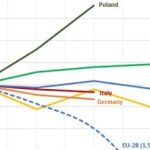Diana-Paula Gherasim at the IFRI Centre for Energy & Climate summarises her 36-page data-rich report on the progress and challenges for the ten Central and Eastern EU (CEECs) countries in decarbonisation. The Russian invasion of Ukraine has focussed all minds on energy security and the best solutions: less fossils, efficiency gains and clean energy made in the EU. Gherasim says that vitally important progress is being made in avoiding a … [Read more...]
Europe must simultaneously replace Russia’s fossil exports and accelerate its clean energy deployment
The Ukraine crisis has had an immediate impact on Europe’s strategy for energy supply security. And this week’s sudden halting of gas supplies by Russia to Poland and Bulgaria only emphasises the urgency. Dolf Gielen, Ricardo Gorini, Luis Janeiro and Seán Collins at IRENA look at the best options, basing their findings on their latest “World Energy Transitions Outlook”, published in March, that lays out a routemap for the next eight years for … [Read more...]
Wind, Solar: continuing cost declines will help meet rising renewables targets
The EC’s “Fit for 55” proposals include the raising of the EU’s 2030 target for total energy produced from renewable sources to 40%. Much of the rest of the world will likely raise its targets at some point too. Continuing to cut the cost of renewable energy generation will be essential to make that happen, and take pressure off all the other associated costs of supporting its integration into the energy system. Michael Taylor at IRENA summarises … [Read more...]
Central and Eastern Europe’s buildings renovation plans fall far short of 55% emissions cuts
There are big decarbonisation gains to be had in a renovation wave in Central and Eastern Europe (CEE) precisely because their building stock is very energy-inefficient, explains Christophe Jost at CEE Bankwatch. But Bankwatch's report on eight national plans - Bulgaria, Czechia, Estonia, Hungary, Latvia, Poland, Romania and Slovakia – reveals weaknesses in scale, funding, strategy and policy. Many are planning to comply with only the former 40% … [Read more...]
Europe’s 55% emissions cut by 2030: proposed target means even faster coal exit
The EC is proposing a target emissions reduction of 55% by 2030 compared to 1990 levels, instead of the previously agreed 40% (which the EU is on course to surpass). The main tool for achieving it will be the EU Emissions Trading System (ETS). Prices for allowances will rise, making coal increasingly uncompetitive. Sören Amelang, Kerstine Appunn and Julian Wettengel at CLEW talked to a number of experts who say the new target implies a near total … [Read more...]
The EU can support Central and East Europe’s transition
Six Central and East European nations, heavily dependent on coal, have been very cautious about the pace of the EU’s transition. For them - Bulgaria, Czechia, Hungary, Poland, Romania and Slovakia - the political and economic disruption looks far harder to bear. E3G has just released a report that suggests this picture can change. The report’s authors – Felix Heilmann, Rebekka Popp and Ada Ámon – explain that coal is becoming less profitable, … [Read more...]
EU policing of Member State gas plans not consistent
Elisa Giannelli at E3G explains why the European Commission’s assessment of Member States’ natural gas plans is not consistent, on three fronts. Firstly, with its own EU climate targets: many nations are planning to increase their consumption of and investment in gas regardless of EU-wide targets to cut emissions. Secondly, the Commission is critical of some of these nations but actually supportive of others. Thirdly, even the EU’s own policies … [Read more...]








